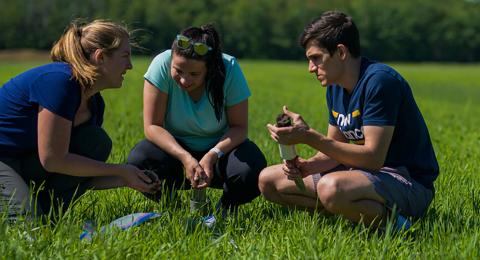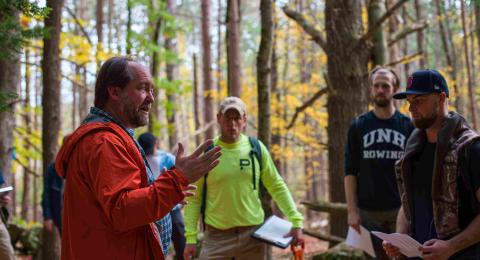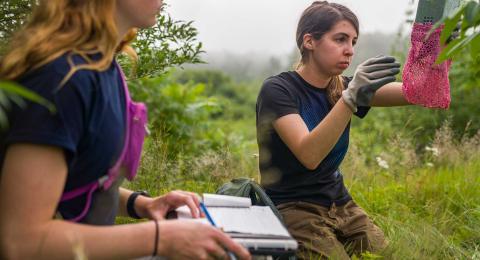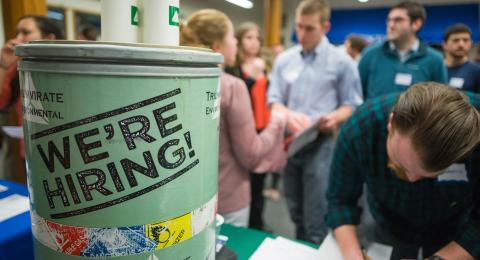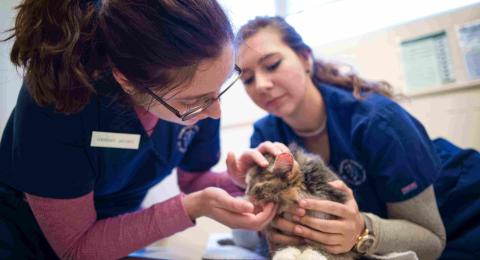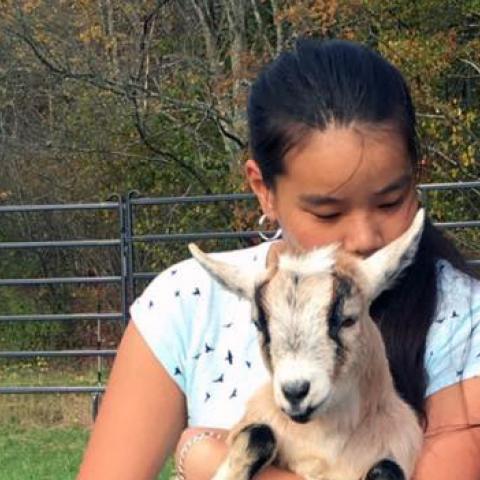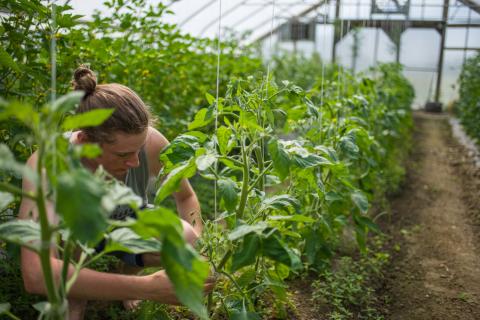Take a look at resources that offer an inside view of academic programs, student life, and career opportunities at UNH’s College of Life Sciences and Agriculture (COLSA). Whether you're planning your next steps or just getting to know UNH, these tools will help you picture your future as a Wildcat.
Real-world Impact
Our students gain hands-on experience through research and internships, applying classroom knowledge to real-world challenges and preparing for successful careers in health and human services.

Explore Frequently Asked Questions
COLSA Programs
Looking for additional details about your specific program? Visit our program detail pages to learn more.
COLSA Facilities
Register for an upcoming campus tour to see where you'll live and learn as a Wildcat.
As a student in the University of New Hampshire's College of Life Sciences and Agriculture (COLSA), you have access to a variety of clubs and organizations that can enrich your academic experience and connect you with peers who share your interests. Here are some student organizations that may align with your passions:
American Fisheries Society
This organization is dedicated to the conservation, development, and wise use of fisheries. Joining can provide opportunities to engage in fisheries research, management, and education.
American Society for Biochemistry and Molecular Biology
Aimed at students interested in the molecular life sciences, this society offers a platform to delve deeper into biochemistry and molecular biology through events, research opportunities, and networking.
Alpha Epsilon Delta: Pre-Professional Health Honor Society
If you're pursuing a career in health professions, this honor society provides resources, mentorship, and networking opportunities to support your journey.
Organic Garden Club
For those passionate about sustainable agriculture and gardening, this club offers hands-on experiences in organic farming practices and promotes awareness of sustainable food systems.
Phi Sigma Biological Sciences Honor Society
|This honor society recognizes academic excellence in the biological sciences and provides members with opportunities for research, leadership, and community service. To explore these and other student organizations, you can utilize Catalyst, UNH’s student involvement tool. Catalyst helps students discover and connect with over 275 recognized student organizations at UNH.
As a student at the University of New Hampshire's College of Life Sciences and Agriculture (COLSA), you have access to a wide array of internship opportunities that provide hands-on experience in your field of study. Here are some examples of internships that COLSA students have recently undertaken:
Wildlife Care Intern at Southwick’s Zoo
Kaylee Galvin ’24, a double major in zoology and neuroscience and behavior with a minor in marine biology, completed a summer internship as a wildlife care intern at Southwick’s Zoo in Mendon, Massachusetts.
Sustainability Fellowship with the UNH Sustainability Institute
Olivia Elliott ’26, a nutritional sciences major, received a Sustainability Fellowship to support food safety initiatives in New Hampshire.
Marine Research Intern at The Maritime Aquarium at Norwalk
Olivia Lucia ’26, a marine, estuarine, and freshwater biology major, spent her summer caring for marine animals and conducting research as part of her internship at The Maritime Aquarium at Norwalk.
Wildlife Rehabilitation Intern at Cape Wildlife Center
Emily Chesterton ’25, a wildlife and conservation biology major, interned at the Cape Wildlife Center in Barnstable, Massachusetts, where she gained experience in wildlife rehabilitation.
Social Innovation Internship
COLSA students have participated in the Social Innovation Internship program, a 9-week summer experience that connects students to leading for-profit and nonprofit organizations. This program provides rigorous and meaningful internships, along with UNH training in social innovation.
UNH's Career and Professional Success (CaPS) office offers resources to assist in your internship search, including Handshake, a platform that connects students with employers and opportunities. Engaging in these internships will not only enhance your academic experience but also provide valuable skills and professional connections in your chosen field.
As a student at the University of New Hampshire's College of Life Sciences and Agriculture (COLSA), you have the opportunity to engage in a diverse array of research projects that span multiple disciplines. Here are some examples of research areas and projects you might consider:
Nutrition and Health
- College Health and Nutrition Assessment Survey (CHANAS): Participate in managing and analyzing data for this long-running survey targeting 18 to 24-year-old adults, unique to UNH. For instance, Anthony Dempsey, a nutrition: dietetics major, has been involved in this project, contributing to valuable insights into young adult health and nutrition.
Forestry and Environmental Science
- Ecohydrology Lab Projects: Engage in research focusing on the interactions between water and ecosystems. Nicolas Forestell, a double major in forestry and French, has worked in Professor Heidi Asbjornsen's Ecohydrology Lab, studying topics such as forest water use and climate change impacts.
Marine Biology and Ecology
- Quantitative Marine Ecology Lab: Contribute to projects that involve quantitative analysis of marine ecosystems. The lab often has openings for undergraduate students to collaborate on existing projects or design their own research experiences, focusing on developing quantitative skills in marine systems.
Sustainable Agriculture and Food Systems
- Agricultural Experiment Station Projects: Participate in research aimed at improving agricultural practices, enhancing crop yields, and promoting sustainability. Projects may include studying plant genetics, soil health, or integrated pest management.
Wildlife and Conservation Biology
- Wildlife Habitat Assessment: Engage in field studies assessing habitats and populations of various wildlife species. This could involve tracking animal movements, analyzing habitat use, and contributing to conservation management plans.
Getting Involved in Research
To explore these opportunities, consider the following steps:
-
Hamel Center for Undergraduate Research: The Hamel Center provides resources and financial support for undergraduate research projects. They offer various programs and grants to assist students in conducting independent research.
-
Faculty Collaboration: Reach out to professors whose research aligns with your interests. Many faculty members welcome undergraduate students into their labs and can guide you in developing your research skills.
-
Undergraduate Research Conference (URC): Participate in the annual COLSA Undergraduate Research Conference, where students present their research findings. This event provides a platform to showcase your work and gain feedback from peers and faculty.
By engaging in these research projects, you'll gain hands-on experience, enhance your problem-solving skills, and contribute to advancements in your field of study.


Ready to take the next step?
Let's make it official! Here are some helpful links and resources to get you one step closer to becoming a UNH Wildcat.
Get in touch and we will get back to you as soon as we can.

